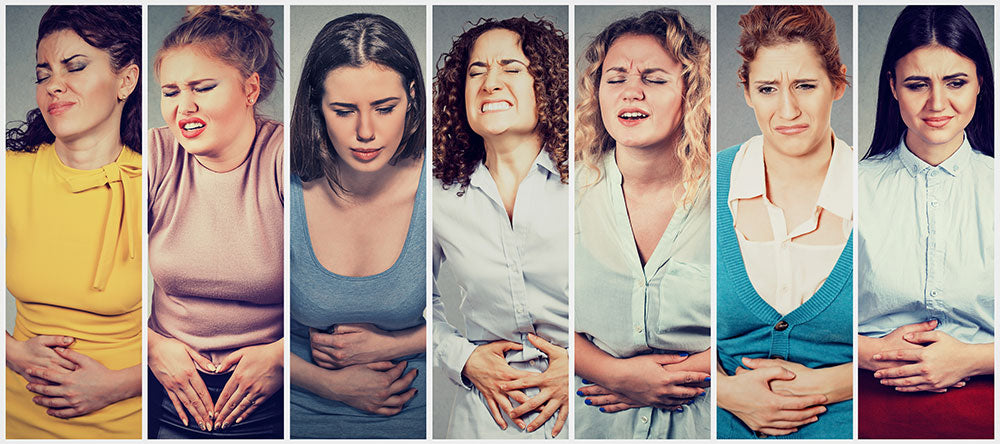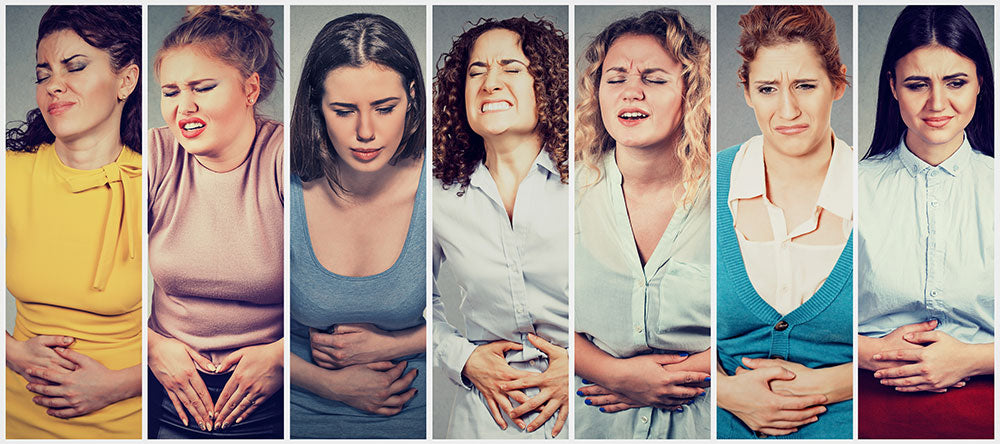
Have you heard of PMDD?
Share

Most 'people who period' experience some level of premenstrual syndrome (PMS) symptoms before their period. The usual irritability, discomfort, cravings (polishing off a tub of ice cream before you realise what’s happening!) and crying for no apparent reason. But what if these symptoms are next level. What if you find yourself doubled over in pain, experiencing wild mood swings and unable to sleep despite feeling utterly exhausted? You may well be one of the 3-8% of the population affected by Premenstrual Dysphoric Disorder (PMDD).
PMDD is a severe and debilitating form of premenstrual syndrome (PMS) that affects a small percentage of the menstruating population. It is characterised by a range of emotional, physical, and behavioral symptoms that occur in the luteal phase of the menstrual cycle, typically in the two weeks before menstruation. These symptoms are more severe and disruptive than those typically associated with PMS. For many sufferers, it’s a debilitating disorder that affects their career, relationships, and overall health. One study estimated that women suffering from PMDD actually lose three years of their lives due to the misery they experience on a regular basis.
Common symptoms of PMDD can include:
- Severe mood swings, including depression, irritability, sudden sadness and anger.
- Anxiety and tension.
- Fatigue and lack of energy.
- Brain fog or difficulty concentrating.
- Food cravings, overeating, change in appetite.
- Sleep disturbances – insomnia or sleeping in excess.
- Physical symptoms like breast tenderness, headaches, bloat, and joint or muscle pain.
PMDD can significantly impact a person's quality of life and daily functioning. The exact cause of PMDD is not well understood, but hormonal changes during the menstrual cycle, neurotransmitter imbalances, and genetic factors may play a role. Diagnosis typically involves tracking symptoms across multiple menstrual cycles and ruling out other underlying medical conditions.
Treatment options for PMDD
Lifestyle Changes:
Regular exercise
Engaging in regular physical activity can help alleviate PMDD symptoms.
Balanced Diet
Eating a well-balanced diet with adequate nutrients, including calcium and magnesium, can be beneficial.
Stress management
Practicing relaxation techniques such as meditation, deep breathing, and yoga can help reduce stress, which can exacerbate PMDD symptoms.
Sleep
Ensure you get sufficient and restful sleep, as poor sleep can worsen PMDD symptoms.
Medications:
Nonsteroidal Anti-Inflammatory Drugs (NSAIDs)
Over-the-counter NSAIDs like ibuprofen can help relieve pain and discomfort associated with PMDD.
Antidepressants
Selective serotonin reuptake inhibitors (SSRIs) and serotonin-norepinephrine reuptake inhibitors (SNRIs) are commonly prescribed to alleviate emotional symptoms such as depression and anxiety.
Hormonal Therapies
Birth control pills: Some types of birth control pills can help regulate hormone fluctuations and reduce PMDD symptoms.
Gonadotropin-Releasing Hormone (GnRH) agonists: These medications suppress the menstrual cycle and may provide relief for PMDD symptoms.
Hormone replacement therapy (HRT): In some cases, HRT may be recommended to balance hormone levels.
Nutritional Supplements:
Calcium and magnesium supplements may help with symptom relief.
Cognitive-Behavioural Therapy (CBT)
CBT is a type of psychotherapy that can help individuals learn to cope with and manage the emotional and psychological symptoms of PMDD.
Herbal Remedies:
Some people explore herbal remedies such as chasteberry (Vitex agnus-castus) or evening primrose oil, but the evidence supporting their effectiveness is limited.
Lifestyle Tracking:
Keeping a symptom diary or using apps designed for tracking PMS and PMDD symptoms can help identify patterns and triggers, which can guide treatment and management strategies.
Treatment for PMDD may vary from person to person, and what works best for one individual might not be as effective for another. It’s important to note that PMDD is a medical condition, and if you suspect you have PMDD or are experiencing severe PMS symptoms, you should consult a healthcare professional for a proper diagnosis and individualised treatment plan.

Having lived with PMDD for many years Jnine founder, Janine Coppeller, has tried nearly all the options out there to manage her symptoms. While everybody is different, here are the 3 tips she swears by:
1. Preparation is key
For me, living solo means meal prep is huge as if I was to eat take away when in my bad weeks it would make my hormones worse. Not saying if you feel like some sort of junk food not to eat it, but I wouldn't recommend eating it every day. I know there are days where I don't want to cook so having homecooked meals in the freezer helps. Try and find out what foods are triggers for you and stay clear. Alcohol is a big no no for me as is high histamine foods and gluten.2. Make sure those close to you are aware
It's important the significant people in your life know what is happening and you don't feel guilty if you haven't answered their calls or texts. Set boundaries, if you have that one friend that drains your energy or doesn't understand what you go through don't call them when you are struggling with PMDD.
In the workplace, if you're having a bad PMDD day talk to a colleague who you have a close relationship and share what you can. This can take a lot of the anxiety away.
3. Set reminders
I remind myself that what I am experiencing is my hormones and it is temporary. I often can't do class work outs when i have very bad days but if I walk to the beach or near water and breathe, it helps. Sometimes I can only manage 10 mins but it's better than nothing. More recently meditation and breathe work have been a huge help.
